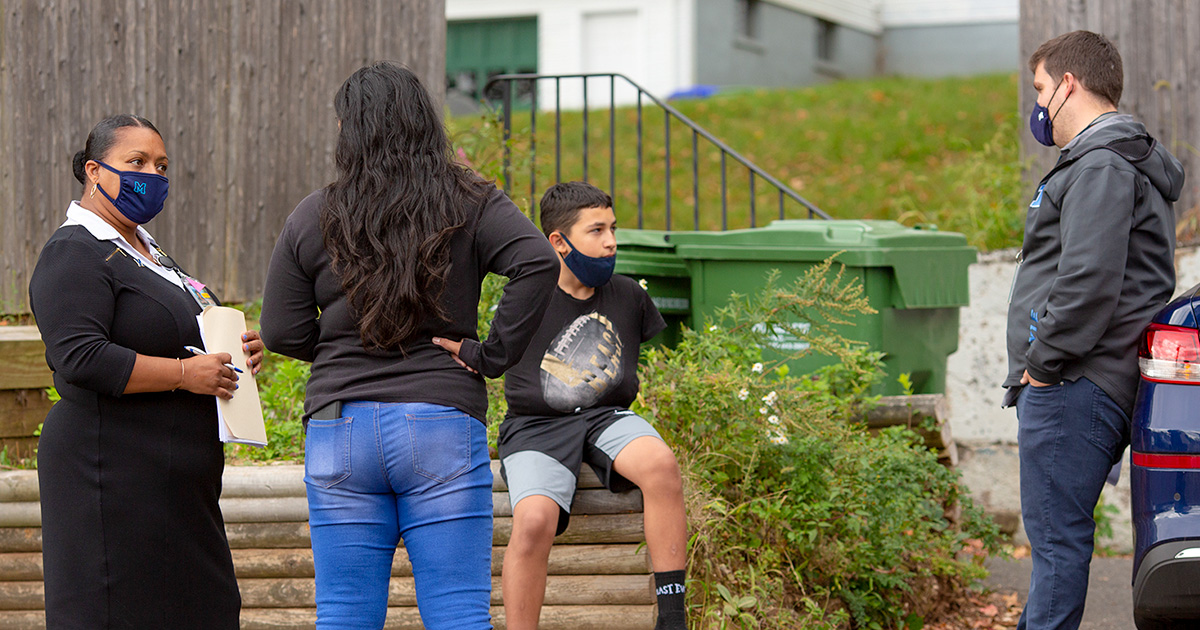
Strong partnerships, in which families and schools work together, can empower families to engage in and support teaching and learning. There is ample evidence on how important these partnerships are to children’s learning and lifelong success.[1] Successful engagement depends on comprehensive, collaborative, and concentrated work to build relationships with families. Family engagement is also a key facet of school improvement.
As a result of the pandemic, family members became critical learning partners. In response, schools and districts have focused on implementing policies and programs that engage families more effectively. The innovative approaches that arose from these efforts are still emerging as we return to full-time, in-person learning. Some of these approaches foster ongoing relationships between teachers and families and the sharing of learning activities and tips.
REL Mid-Atlantic has supported its stakeholders across the region in several projects designed to understand and increase family engagement. Our partnership with the District of Columbia Public Schools revealed the important benefits of the district’s home visiting program: students who had family visits from their teachers the summer before school started had fewer disciplinary actions and higher attendance during the following school year. In partnership with the Delaware Department of Education, we co-developed a framework for family engagement that we shared with districts statewide. In our work with the New Jersey Department of Education, we examined research-informed strategies for family engagement that support learning in preschool through 3rd grade. We also spoke directly with New Jersey practitioners to discuss aspects of feasibility and accessibility that should be considered when engaging families. We worked with the New Jersey Department of Education to co-develop resources and strategies that complemented the state’s current model for engaging families in early childhood learning and development. This work included encouraging equitable family-school partnerships to expand learning beyond the classroom.
These collaborations suggested several lessons for districts and schools to keep in mind as they design and implement family engagement programs.
- Build positive relationships with families by acknowledging the challenges and barriers they face and establishing strong, open lines of communication.
- For example, build on the interests and competencies of families and children. Communicate consistently with families throughout the year, highlighting what is going well. When challenges arise, and the school and family need to collaborate an intervene to support a child, the partnership will already be in place, and families will know how to give input on strategies and next steps. Check out this fact sheet for more tips on building meaningful partnerships.
- Use evidence-informed practices to engage families directly, giving them activities that help them actively participate in their children’s learning.
- For example, offer tips for engaging children in storytelling, such as ways to ask children questions, use gestures, and make connections between the stories and children’s lives. Check out this handout,i] produced in partnership with the New Jersey Department of Education, that gives families ideas for supporting learning. In addition, there are several REL resources devoted to parents and families, which can be found here.
- Empower educators and families to use data to set and achieve high expectations, make informed decisions, and strengthen effective practices.
- Schools can collaborate with families to decide on desired outcomes and develop action plans to achieve them. Families can use school-provided tools and resources to monitor the progress of students and schools, and they should give teachers feedback, offer their observations, and collaborate on shared goals.
- Establish a teacher home visiting program to improve student behavior and attendance.
- Home visits meet families where they are. Engaging with families outside of school helps form a shared understanding and shows that teachers care about their students. Schools and districts that have implemented—or are considering implementing—home visiting programs should decide how to use resources effectively to encourage families to get engaged and help improve student outcomes, always with costs and feasibility in mind. Check out this blog post to learn more about home visiting programs.
Footnote
[1] Epstein, J.L., Sanders, M.G., Sheldon, S. B., Simon, B. S., Salinas, K. C., Jansorn, N. R., Van Voorhis, F. L, Martin, C. S., Thomas, B.G., Greenfield, M. D., Hutchins, D. J., & Williams, K. J. (2019). School, family, and community partnerships: Your handbook for action (4th ed.). Corwin; University of Plymouth. (2019). Parental involvement plays key role in children’s academic attainment, research shows: Parental engagement has a positive effect on a child’s academic attainment—regardless of age or socioeconomic status. ScienceDaily; National Academies of Sciences, Engineering, and Medicine. (2016). Parenting matters: Supporting parents of children ages 0–8. The National Academies Press. https://doi.org/10.17226/21868; Henderson, A. T., & Mapp, K. L. (2002). A new wave of evidence: The impact of school, family, and community connections on student achievement. National Center for Family and Community Connections with Schools, Southwest Educational Development Laboratory. https://sedl.org/connections/resources/evidence.pdf
[i] This handout is also available in Spanish here: https://ies.ed.gov/ncee/edlabs/regions/midatlantic/app/Docs/technicalassistance/FamilyActivityHandout_Spanish.pdf
Cross-posted from the REL Mid-Atlantic website.



